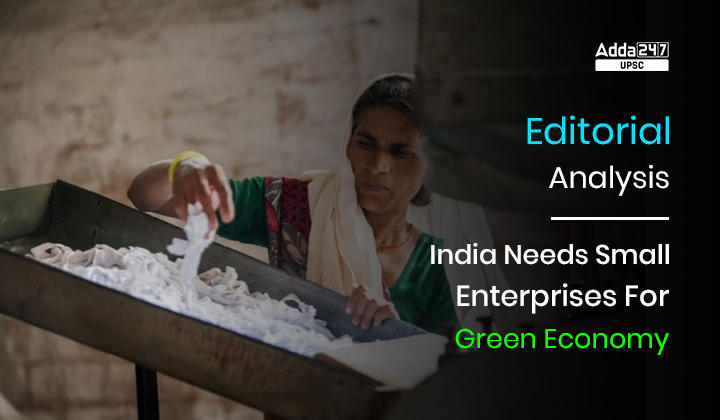Table of Contents
India Needs Small Enterprises For Green Economy
Today’s Editorial Analysis is Based on the Union government’s ambitious National Green Hydrogen Mission. It talks about the importance of encouraging Small and Medium Enterprises For converting India Into a Green Economy Hub.
Analysis of Sansad TV Discussion: Green Hydrogen
Context of Today’s Editorial Analysis
- Current: The Union Cabinet has cleared a ₹17,490-crore National Green Hydrogen (NGH) mission that aims to facilitate the production of hydrogen from renewable energy.
- Background: As per its Nationally Determined Contribution (NDC) to meeting the goals of the Paris Agreement, India has committed to reduce emissions intensity of its GDP by 45% by 2030, from 2005 levels.
What is green hydrogen?
|
What is the National Green Hydrogen Mission?
- Intent: The intent of the National Green Hydrogen Mission is to incentivise the commercial production of green hydrogen and make India a net exporter of the fuel.
- Target: The mission has laid out a target to develop green hydrogen production capacity of at least 5 MMT (Million Metric Tonne) per annum. This is alongside adding renewable energy capacity of about 125 GW (gigawatt) in the country.
- Decarbonisation: National Green Hydrogen Mission will entail the decarbonisation of the industrial, mobility and energy sectors; reducing dependence on imported fossil fuels and feedstock; developing indigenous manufacturing capabilities; creating employment opportunities; and developing new technologies such as efficient fuel cells. About 50 MMT per annum of CO2 emissions are expected to be averted by 2030.
- Job Creation: By 2030, the Centre hopes its investments will bring in investments worth ₹8 trillion and create over six lakh jobs.
National Green Hydrogen Mission Approved by Union Cabinet Chaired by PM Modi
How will the NGH Mission support green hydrogen production?
- The NGH Mission will facilitate demand creation, production, utilisation and export of Green Hydrogen.
- There are two umbrella sub-missions under the programme. The first is the Strategic Interventions for Green Hydrogen Transition Programme (SIGHT), that will fund the domestic manufacturing of electrolysers and produce green hydrogen.
- The second is to support pilot projects in emerging end-use sectors and production pathways.
- States and regions capable of supporting large scale production and/or utilisation of hydrogen will be identified and developed as Green Hydrogen Hubs.
Green hydrogen- Definition, India’s Current Production and Key Advantages
What Are The Challenges To Manufacture Green Hydrogen?
- Currently, Green hydrogen, because of the entailed expenses, accounts for less than 1% of global hydrogen production and India’s aim is to become a global, industrial hub and exporter of such hydrogen.
- A kilogram of black hydrogen costs $0.9-1.5 to produce while grey hydrogen costs $1.7-2.3 and blue hydrogen can cost anywhere from $1.3-3.6. However, green hydrogen costs $3.5-5.5 per kg, according to a 2020 analysis by the Council for Energy, Environment and Water.
The Editorial Analysis: Going Green
Why India Needs Small Enterprises For Green Economy?
- For India to realise its Green ambitions, it must strengthen its small manufacturing and allied enterprises infrastructure which, rather than large industries, will be the mainstay of any green economy.
- Several major industrial houses have announced plans to facilitate India’s adoption of green hydrogen.
- However, instead of going with big industries, upgrading the manufacturing and skill levels of its small and medium manufacturing enterprises and developing a transmission network would be more convenient to supply the hydrogen produced from supply-spots to industrial centres across the country.
- Many advanced economies have also announced plans and policies to develop such a Green economy through Small and Medium Enterprises.
Way Forward
- India can take the lead in being a major Green Hydrogen producer, it doesn’t have the necessary infrastructure yet to execute all these intermediary steps.
- So, promoting Small and Medium Enterprises is the only way forward to create a countrywide awareness about Green Hydrogen and Green Economy.
- India also needs to announce incentives to convince enough users of industrial hydrogen to adopt green hydrogen.
- It needs to develop supply chains in the form of pipelines, tankers, intermediate storage and last leg distribution networks as well as put in place an effective skill development programme to ensure that lakhs of workers can be suitably trained to adapt to a viable green hydrogen economy.
Analysis Of Down To Earth Magazine: How Green is Blue Hydrogen?



 TSPSC Group 1 Question Paper 2024, Downl...
TSPSC Group 1 Question Paper 2024, Downl...
 TSPSC Group 1 Answer key 2024 Out, Downl...
TSPSC Group 1 Answer key 2024 Out, Downl...
 UPSC Prelims 2024 Question Paper, Downlo...
UPSC Prelims 2024 Question Paper, Downlo...




